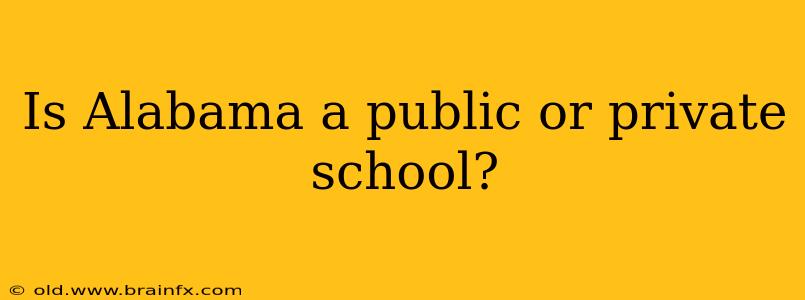Alabama's Education System: Public Schools and Beyond
The simple answer to "Is Alabama a public or private school?" is neither. Alabama, like all states in the US, has a system of public schools funded primarily by state and local taxes. However, it also boasts a significant number of private schools, which operate independently and receive no public funding. Understanding the differences and nuances of both is crucial.
Public Schools in Alabama: A Statewide System
Alabama's public education system is a vast network of schools serving students from kindergarten through 12th grade. These schools are governed by local school boards and the Alabama State Department of Education, ensuring adherence to state standards and curriculum. Funding primarily comes from state and local taxes, supplemented by federal grants.
Public schools in Alabama aim to provide free and accessible education to all residents within the state. They are expected to meet certain educational standards and undergo regular assessments to evaluate their effectiveness. This system, while striving for equity, faces challenges common to many public education systems across the United States, including funding disparities between wealthier and poorer districts, and the ongoing need for improved teacher retention and resources.
Private Schools in Alabama: Diverse Options
Private schools in Alabama are independent institutions, not funded by the state or local governments. They are free to set their own curricula, admission requirements, and tuition fees. This results in a diverse range of options for parents seeking alternatives to the public school system.
Several types of private schools exist in Alabama, including:
- Religious schools: These are often affiliated with a particular faith and incorporate religious instruction into their curriculum.
- Independent schools: These are non-religious schools that may focus on specific educational philosophies or learning styles.
- Preparatory schools: These schools often focus on college preparation and often have high academic standards.
- Homeschooling: While not a school in the traditional sense, homeschooling is a legal and increasingly popular alternative to both public and private schools in Alabama.
The choice between public and private schooling in Alabama ultimately rests with parents, weighing factors like cost, educational philosophy, religious affiliation, and the specific needs and learning styles of their children. Each option offers unique advantages and disadvantages.
Understanding the Landscape: Key Considerations
When considering education options in Alabama, it's essential to:
- Research individual schools: Public schools vary considerably in quality and resources across the state. Similarly, private schools offer a wide array of approaches and price points. Thorough research is vital.
- Consider your child's needs: The best school is one that best meets your child's individual learning needs and personality.
- Factor in cost: While public schools are free, private schools can be expensive, requiring careful consideration of tuition and other associated fees.
- Understand state regulations: Familiarize yourself with the laws and regulations governing both public and private education in Alabama.
In conclusion, while Alabama doesn't operate as a single "school," its education system encompasses a robust public system alongside a diverse range of private school options. Parents must carefully consider their child's needs, available resources, and their own educational priorities when making this significant decision.

